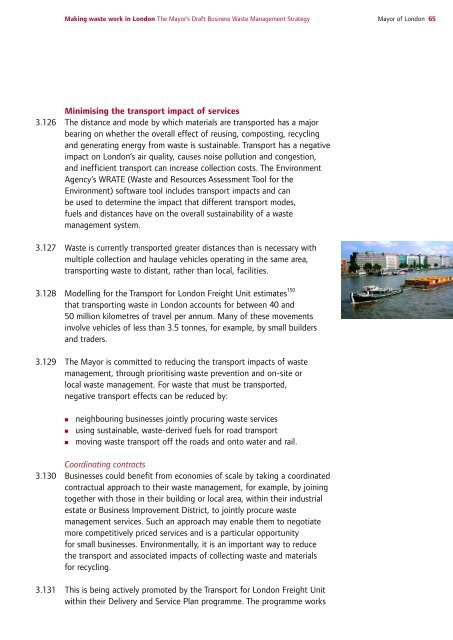Draft Business Waste Strategy PDF - london.gov.uk - Greater ...
Draft Business Waste Strategy PDF - london.gov.uk - Greater ...
Draft Business Waste Strategy PDF - london.gov.uk - Greater ...
Create successful ePaper yourself
Turn your PDF publications into a flip-book with our unique Google optimized e-Paper software.
Making waste work in London The Mayor’s <strong>Draft</strong> <strong>Business</strong> <strong>Waste</strong> Management <strong>Strategy</strong> Mayor of London 65<br />
Minimising the transport impact of services<br />
3.126 The distance and mode by which materials are transported has a major<br />
bearing on whether the overall effect of reusing, composting, recycling<br />
and generating energy from waste is sustainable. Transport has a negative<br />
impact on London’s air quality, causes noise pollution and congestion,<br />
and inefficient transport can increase collection costs. The Environment<br />
Agency’s WRATE (<strong>Waste</strong> and Resources Assessment Tool for the<br />
Environment) software tool includes transport impacts and can<br />
be used to determine the impact that different transport modes,<br />
fuels and distances have on the overall sustainability of a waste<br />
management system.<br />
3.127 <strong>Waste</strong> is currently transported greater distances than is necessary with<br />
multiple collection and haulage vehicles operating in the same area,<br />
transporting waste to distant, rather than local, facilities.<br />
3.128 Modelling for the Transport for London Freight Unit estimates 150<br />
that transporting waste in London accounts for between 40 and<br />
50 million kilometres of travel per annum. Many of these movements<br />
involve vehicles of less than 3.5 tonnes, for example, by small builders<br />
and traders.<br />
3.129 The Mayor is committed to reducing the transport impacts of waste<br />
management, through prioritising waste prevention and on-site or<br />
local waste management. For waste that must be transported,<br />
negative transport effects can be reduced by:<br />
■ neighbouring businesses jointly procuring waste services<br />
■ using sustainable, waste-derived fuels for road transport<br />
■ moving waste transport off the roads and onto water and rail.<br />
Coordinating contracts<br />
3.130 <strong>Business</strong>es could benefit from economies of scale by taking a coordinated<br />
contractual approach to their waste management, for example, by joining<br />
together with those in their building or local area, within their industrial<br />
estate or <strong>Business</strong> Improvement District, to jointly procure waste<br />
management services. Such an approach may enable them to negotiate<br />
more competitively priced services and is a particular opportunity<br />
for small businesses. Environmentally, it is an important way to reduce<br />
the transport and associated impacts of collecting waste and materials<br />
for recycling.<br />
3.131 This is being actively promoted by the Transport for London Freight Unit<br />
within their Delivery and Service Plan programme. The programme works
















